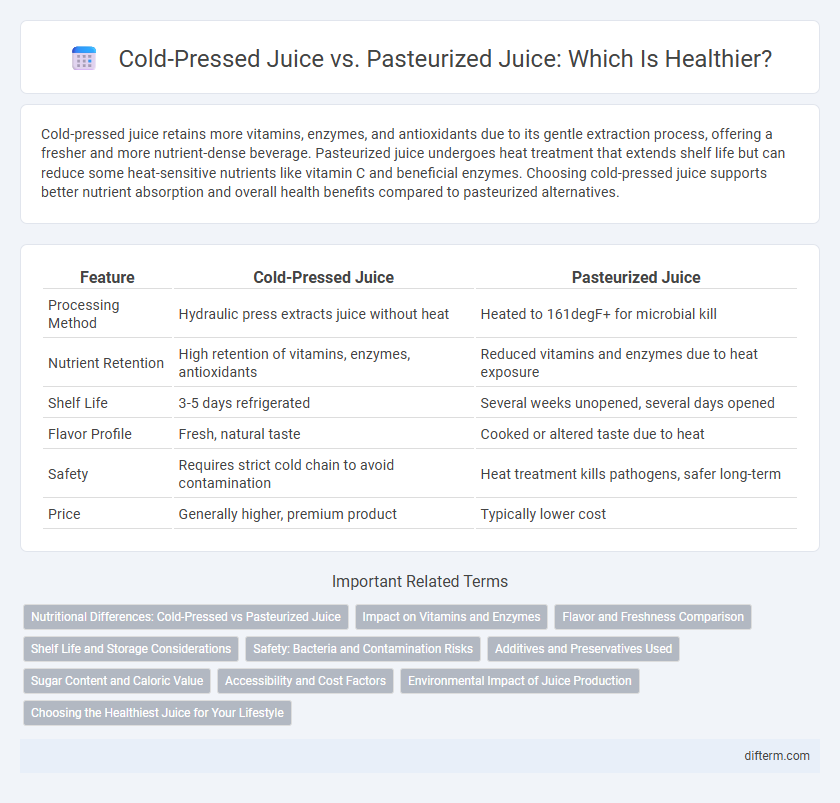Cold-pressed juice retains more vitamins, enzymes, and antioxidants due to its gentle extraction process, offering a fresher and more nutrient-dense beverage. Pasteurized juice undergoes heat treatment that extends shelf life but can reduce some heat-sensitive nutrients like vitamin C and beneficial enzymes. Choosing cold-pressed juice supports better nutrient absorption and overall health benefits compared to pasteurized alternatives.
Table of Comparison
| Feature | Cold-Pressed Juice | Pasteurized Juice |
|---|---|---|
| Processing Method | Hydraulic press extracts juice without heat | Heated to 161degF+ for microbial kill |
| Nutrient Retention | High retention of vitamins, enzymes, antioxidants | Reduced vitamins and enzymes due to heat exposure |
| Shelf Life | 3-5 days refrigerated | Several weeks unopened, several days opened |
| Flavor Profile | Fresh, natural taste | Cooked or altered taste due to heat |
| Safety | Requires strict cold chain to avoid contamination | Heat treatment kills pathogens, safer long-term |
| Price | Generally higher, premium product | Typically lower cost |
Nutritional Differences: Cold-Pressed vs Pasteurized Juice
Cold-pressed juice retains higher levels of vitamins, enzymes, and antioxidants due to its low-temperature extraction process, which minimizes nutrient degradation. Pasteurized juice undergoes heat treatment that extends shelf life but significantly reduces heat-sensitive nutrients such as vitamin C and certain phytonutrients. Choosing cold-pressed juice ensures a more potent intake of natural nutrients beneficial for immune support and overall health.
Impact on Vitamins and Enzymes
Cold-pressed juice retains higher levels of vitamins such as vitamin C and B-complex due to minimal heat exposure during extraction, preserving nutrient integrity. Pasteurized juice undergoes heat treatment that can degrade sensitive vitamins and denature enzymes essential for digestion and immune support. Enzymes like amylase and catalase remain active in cold-pressed juice, enhancing nutrient absorption, whereas pasteurization significantly reduces enzymatic activity.
Flavor and Freshness Comparison
Cold-pressed juice retains a vibrant, natural flavor and higher nutrient levels due to minimal heat exposure, preserving the juice's fresh taste and freshness. Pasteurized juice undergoes heat treatment, which can diminish flavor complexity and reduce the perception of freshness by altering volatile compounds. Consumers seeking intense flavor and maximum freshness often prefer cold-pressed juice for its raw, crisp profile.
Shelf Life and Storage Considerations
Cold-pressed juice typically has a shorter shelf life of 3 to 5 days due to minimal heat treatment, requiring refrigeration at temperatures below 40degF to maintain freshness and preserve nutrients. Pasteurized juice undergoes heat processing, extending shelf life up to 30 days or more and allowing storage at room temperature until opened, but this process can reduce some heat-sensitive vitamins and enzymes. Proper storage conditions are critical for both types to prevent spoilage and maintain quality, with cold-pressed juice demanding stricter refrigeration and rapid consumption.
Safety: Bacteria and Contamination Risks
Cold-pressed juice, produced through hydraulic pressure without heat, retains more nutrients but carries a higher risk of bacterial contamination due to minimal pasteurization. Pasteurized juice undergoes heat treatment that effectively kills harmful bacteria, significantly reducing contamination risks and enhancing safety for consumption. Consumers prioritizing safety should consider pasteurized options, while cold-pressed juice requires strict hygiene controls and rapid refrigeration to mitigate bacterial growth.
Additives and Preservatives Used
Cold-pressed juice retains more natural nutrients as it is usually free from additives and preservatives, relying on refrigeration to maintain freshness. Pasteurized juice often contains added preservatives such as sodium benzoate or potassium sorbate to extend shelf life beyond refrigeration. Consumers concerned about chemical additives favor cold-pressed juice for its minimal processing and absence of synthetic preservatives.
Sugar Content and Caloric Value
Cold-pressed juice typically retains higher levels of natural enzymes and nutrients due to minimal heat exposure, but it can contain similar sugar content to pasteurized juice, derived from the fruit itself. Pasteurized juice undergoes heat treatment to extend shelf life, which may slightly reduce vitamin content but does not significantly alter the sugar content or caloric value. Consumers seeking lower calorie options should compare labels carefully, as both types can have comparable calories, largely influenced by the fruit blend used.
Accessibility and Cost Factors
Cold-pressed juice often commands a higher price due to its nutrient-retaining extraction method and limited shelf life, impacting accessibility for budget-conscious consumers. Pasteurized juice benefits from mass production and extended shelf stability, making it widely available and more affordable in grocery stores. The cost difference reflects production techniques, with cold-pressed juices appealing to health-focused buyers willing to invest more.
Environmental Impact of Juice Production
Cold-pressed juice production consumes less energy due to minimal heat usage compared to pasteurized juice, which requires high-temperature processing that increases carbon emissions. Cold-pressed methods preserve more nutrients, reducing food waste from spoilage, while pasteurization extends shelf life but relies heavily on packaging materials that contribute to landfill waste. Sustainable sourcing of fruits and efficient transport logistics further influence the environmental footprint of both juice types.
Choosing the Healthiest Juice for Your Lifestyle
Cold-pressed juice retains more vitamins, enzymes, and antioxidants due to minimal heat exposure, promoting better digestion and immune support. Pasteurized juice, subjected to high heat, extends shelf life and reduces bacteria but may diminish nutrient content and flavor. Choosing the healthiest juice depends on prioritizing nutrient density and freshness for maximum health benefits or opting for convenience and safety with longer-lasting pasteurized options.
Cold-pressed juice vs Pasteurized juice Infographic

 difterm.com
difterm.com